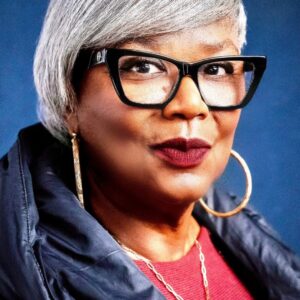with Shay Wafer

Photo Credit: Jamal Lawson Photography
“I am because we are” is the cherished Ubuntu mindset which leads the mission and work of the Waco Theater Center of North Hollywood, founded in North Hollywood in 2017 by Richard and Tina Knowles Lawson. The WACO acronym stands for “Where Art Can Occur,” and this performing and visual arts organization is dedicated to the empowerment of Los Angeles artists, young people, and stories of the African Diaspora. And, yes, Beyoncé, Kelly, and Solange serve on the Advisory Board.
And at the heart of it all is Compton-born Shay Wafer, WACO’s Executive Director, who says “Art and activism have been connected forever. Music and poetry were what brought the civil rights movement to the attention of the larger world, going back to the Harlem Renaissance and even earlier. Art has always reflected and documented social issues, and has the power to change how we may view a particular incident. Like the example of ‘the Central Park 5.’ It wasn’t until the film about it came out that people started to realize what actually happened, that these five kids, children, really, were railroaded into prison. The evening news doesn’t have the same impact.”
WACO Theatre Center is dedicated to the performing arts, visual arts and education and year-round events, currently hosting through May 27 “Witness,” an immersive visual art experience featuring work by Los Angeles-based Black women and non-binary artists who project their vision of the world, society, community, and themselves through their art. The project invites viewers…”to bear witness to what they may not otherwise see on their own.” The Center’s annual Wearable Art Gala fundraiser supporting WACO’s artistic and youth mentorship programs (stand by for the announcement of the 2023 Gala coming in October), glitters with Black luminaries. Hosted by Keke Palmer, last year’s Honorees were Angela Bassett and Mark Bradford with special performances by Obba Babatunde, Chloe and Halle Bailey, and dancers from Debbie Allen’s Dance Academy.
WACO’s electrifying mix of imagery, rhythms, social justice, cinema, dance, cultural politics, spoken word, and philanthropy forms Shay’s happy place today, but the arts were not initially on her career radar. “I didn’t grow up exposed to the arts, particularly. My undergraduate degree is in Early Childhood Education, and I aspired to be a preschool kindergarten teacher,” she recalls. “I wanted to impact my community and open and enrich young minds through education. But then the arts chose me.”
Although she’s anything but star-struck, a chance show-biz connection — she’s friends with Angela Gibbs, daughter of veteran actress Marla Gibbs — presented an unanticipated path. While both in their 20s, they founded the Marla Gibbs’ Crossroads Art Academy and Theatre, and that, as the saying goes, was that. “That’s when I discovered how impactful the arts can be,” says Shay. “I discovered that I loved being around creators, and what mattered to me was and is aligning these artists with support and resources for their creativity.” Shay’s skills in administration and management took her to arts organizations across the country, including the Cornerstone Theatre Company, LA Theatreworks, the St. Louis Black Repertory Company, 651 Arts in Brooklyn, a role as founding VP of Programs for the August Wilson Center for African American Culture in downtown Pittsburgh,
She explains that this alignment… “came organically, arising from choices made by spirit and faith.” But the road has not always been smooth travelling.
“By design, non-profits are structured to receive the majority of their funds from individual contributions. And although what I’m about to say may be changing, Black people historically do NOT donate to the arts. We give generously to churches and universities, but the arts, not so much. That’s one of the structural deficits for Black arts organizations. The whole giving-back thing has not historically been in place, and there are long-range effects. We are so dependent upon contributions from the government and foundations, although I’m glad to say that this is beginning to change,” says Shay.
She adds, “There’s an old adage in fundraising that people give to people, and we know that people give to leaders.” WACO’s undeniable star-quotient factors into the organization’s success and growing visibility today. She notes that “Some of that past business was generational when men were literally running the show. Today, there’s a lot more camaraderie among arts organizations, less ego, and territorialism.”
TAKE IT FROM MISS SHAY:
The arts need you!
Black Elders have many opportunities to play a dynamic role in helping Diasporic arts thrive and flourish. For instance:
- VOLUNTEER: “We often have free time. Share your skill set. Work the phone bank during membership drives for your local gallery. Or be an usher at your local theatre center.”
- DONATE: “I select 5 to 10 organizations, and I give at the end of every year. For any arts organization, it’s the consistency of the contributions on an annual basis that really matters.”
- PLAN: “Put a legacy gift for an arts organization in your will.”
- Wait, WHAT’S A 990? A 990 is the tax form that non-profits submit to the IRS, which recognized 1.8 MILLION tax-exempt organizations. You can view these 990s to research the finances of a charitable organization.
Great article. I personally know Shay Wafer and the commitment she has to the black art community.
She is definitely a Rock Star for the Arts!!! It was an honor to write about her.